
The United Nations established World Food Day in 1979 to celebrate the creation of the Food and Agriculture Organization (FAO) in 1945, an organization formed by 42 countries to end world hunger. This year’s World Food Day theme, “Climate is changing. Food and agriculture must too,” highlights agriculture and food production’s contributions to climate change.


Food Waste Prevention Minimizes Food Production’s Effects on Climate Change
The UN estimates that the world produces enough food to meet the needs of its entire population. Unfortunately, from farm to fork, more than one-third of the food produced is lost. This amounts to 1.3 billion tons of lost food annually, worth $2.6 trillion. This tremendous loss of food not only contributes to malnutrition and poverty, it contributes to greenhouse gas (GHG) emissions. The energy and fuel used in the production, processing, and transportation that ends in food loss combined with the emissions given off by rotting food gives off equals 8 percent of global GHG emissions.
In the Developing World, Improved Post-Harvest Handling Reduces Food Loss
In developing countries, most food loss occurs at the farm level. To reduce such loss, post-harvest handling must improve.

New technologies create more efficient and effective harvesting practices that increase crop yields through decreased loss. Better storage facilities and practices prevent pests and disease from damaging or destroying crops.

Improved Storage Facility in Zambia’s Eastern Province
Processing food into products with longer shelf lives and stability further prevents spoilage. A stable transport chain between farm and fork ensures that crops and products are not lost to spoilage, damage or theft.
In Higher-Income Countries, Consumer Demand for Perfection Results in Food Waste
Food loss becomes more complex, in higher income countries where waste occurs from retailer to consumer. Consumers demand perfect food. They do not want dents in their cans, oddly shaped produce or products past their expiration date. Retailers heed these demands, putting pressure on producers and processors to throw out the imperfect, and themselves tossing food they perceive to have expired. Consumers further exacerbate the problem throwing away uneaten food at restaurants, off their plates, and from the refrigerator.
ACDI/VOCA Integrates Nutrition-Sensitive Activities to Minimize Food Loss
At ACDI/VOCA, we address food loss through the integration of nutrition-sensitive activities along the production pathway.

Through our projects, we help smallholder farmers access higher-quality seeds and improved production practices. We combine new technologies such as shellers, threshers, and drying platforms to decrease the amount of crops lost at harvest. Additionally, we work with project participants to build better storage facilities and utilize improved food preservation techniques at the farm and household levels to ensure that less food is lost. These approaches keep food available for sale or consumption longer and especially during lean seasons. Our work linking producers to markets also helps decrease the likelihood of surplus product going to waste, and improves the hygiene and food safety standards of processers.
One day a year, World Food Day brings the challenges of food security and nutrition to the fore. Every day, ACDI/VOCA works with communities, donors, partners, and the private sector to find solutions to these challenges. Decreasing food waste is one of the many ways we meet the agricultural production and nutrition goals of the communities we serve.








